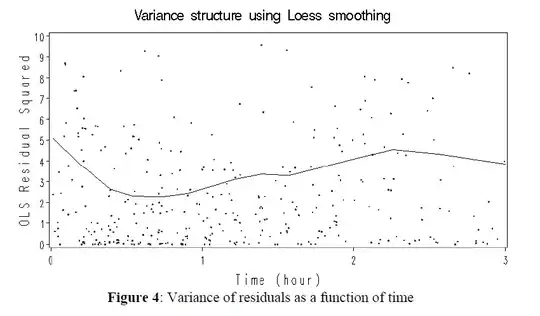Given a random variable $Y = Exp(\lambda)$, what is the mean and variance of $G=\dfrac{1}{Y}$ ?
I look at the Inverse Gamma Distribution, but the mean and variance are only defined for $\alpha>1$ and $\alpha>2$ respectively...
Given a random variable $Y = Exp(\lambda)$, what is the mean and variance of $G=\dfrac{1}{Y}$ ?
I look at the Inverse Gamma Distribution, but the mean and variance are only defined for $\alpha>1$ and $\alpha>2$ respectively...
Given that the inverse exponential distribution has $\alpha = 1$, you have stumbled upon the fact that the mean of the inverse exponential is $\infty$. And therefore, the variance of the inverse exponential is undefined.
If $G$ is inverse exponentially distributed, $E(G^r)$ exists and is finite for $r < 1$, and $= \infty$ for $r = 1$.
I'll show the calculation for the mean of an Exponential distribution so it will recall you the approach. Then, I'll go for the inverse Exponential with the same approach.
Given $f_Y(y) = \lambda e^{-\lambda y}$
$E[Y] = \int_0^\infty{yf_Y(y) dy}$
$ = \int_0^\infty{y \lambda e^{-\lambda y} dy}$
$ = \lambda \int_0^\infty{y e^{-\lambda y} dy}$
Integrating by part (ignore the $\lambda$ in front of the integral for the moment),
$u = y, dv=e^{-\lambda y} dy$
$du = dy, v = \frac{-1}{\lambda}e^{-\lambda y}$
$ = y \frac{-1}{\lambda}e^{-\lambda y} - \int_0^\infty{ \frac{-1}{\lambda}e^{-\lambda y} dy}$
$ = y \frac{-1}{\lambda}e^{-\lambda y} + \frac{1}{\lambda} \int_0^\infty{ e^{-\lambda y} dy}$
$ = y \frac{-1}{\lambda}e^{-\lambda y} - \frac{1}{\lambda^2} e^{-\lambda y}$
Multiply by the $\lambda$ in front of the integral,
$ = - y e^{-\lambda y} - \frac{1}{\lambda} e^{-\lambda y}$
Evaluate for $0$ and $\infty$,
$ = (0 - 0) - \frac{1}{\lambda} (0 - 1)$
$ = \lambda^{-1}$
Which is a known results.
For $G = \frac{1}{Y}$, the same logic apply.
$E[G] = E[\frac{1}{Y}]= \int_0^\infty{\frac{1}{y} f_Y(y) dy}$
$ = \int_0^\infty{\frac{1}{y} \lambda e^{-\lambda y} dy}$
$ = \lambda \int_0^\infty{\frac{1}{y} e^{-\lambda y} dy}$
The main difference is that for an integration by parts,
$u = y^{-1}$
and
$du = -1y^{-2}$
so it doesn't help us for $G = \frac{1}{y}$. I think the integral is undefined here. Wolfram alpha tell me it doesn't converge.
http://www.wolframalpha.com/input/?i=integrate+from+0+to+infinity+(1%2Fx)+exp(-x)+dx
So the mean doesn't exist for the inverse Exponential, or, equivalently, for the inverse Gamma with $\alpha=1$. The reason is similar for the variance and $\alpha \gt 2$.
After a quick simulation (in R), it seems that the mean does not exist :

n<-1000
rates <- c(1,0.5,2,10)
par(mfrow = c(2,2))
for(rate in rates)
{
plot(cumsum(1/rexp(n, rate))/seq(1,n),type='l',main = paste0("Rate = ",rate),
xlab = "Sample size", ylab = "Empirical Mean")
}
For the sake of comparison, here is what happens with a genuine exponential random variable.